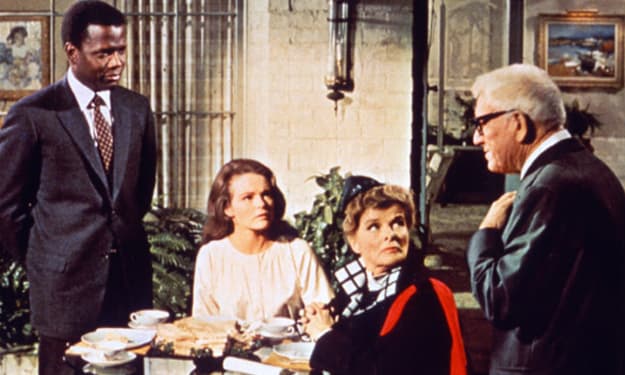'Unforgiven' Has the Perfect Antagonist
Little Bill Graces the Screen Like No Other Villain in Film

I want you to take a moment and think of a movie villain. It can be your favorite, or it can just be a well-known one, or maybe one that’s a little underappreciated at times. Got one? Good. If you were going for someone iconic, you might have thought of a character like Darth Vader, literally any version of the Joker, or maybe even Voldemort. If your tastes aren’t that mainstream, you might have said something along the lines of Hannibal Lecter or Hal 9000 from 2001: A Space Odyssey.
Now, think again. Why did you think of this villain first? What makes them your go-to bad guy when you think about the worst of the worst? Was it the nature of their evil? Were they, to you, the perfect match for the protagonist of the story, the ultimate adversary for the hero? Were they the embodiment of evil against everything that represented good, or was there something else about them that made them so compelling?
We’ve seen the struggle a million times. As John Locke famously pointed out early on in the groundbreaking series Lost, “One side is light, and one side is dark.” The holy and the unholy find a way to battle it out over the course of any movie, putting a very tangible conflict in the middle of the plot structure.
Although, nearly just as many times, we’ve seen gray lines drawn about the playing field. Too many times we are told, “Not everything is black and white,” and yet we are often still given two sides of a coin. Christopher Nolan’s The Dark Knight is a prime example of this. The plot is meant to incite questions from the audience about what it truly means for things to be fair and what it is to be good, but we still know the answer. Batman is the hero, and the Joker is the villain.
But there’s one movie, with a clear protagonist and antagonist, where this doesn’t play out. We don’t see two men meet their maker in the form of opposing ideologies, but rather in very similar ones. And while other forms of media will use this as an excuse to turn the allegiances of characters, Clint Eastwood’s Unforgiven delves into a very real conflict where the antagonist is given one of the most compelling characters ever seen.
To be clear, Unforgiven is far from perfect. There is a certain repetitiveness to the constant flow of “I ain’t like that no more” foreshadowing from Eastwood’s hero that ventures past enthralling into the realm of annoying. Although the outlaw says he'll never regress to his old ways, we know he'll be hell-bent on destruction by the end of the movie. I mean, come on. It's a western. Nevertheless, David Webb Peoples’ screenplay really makes the grade in terms of conflict.
The first impression one gets from the film's antagonist, Gene Hackman’s "Little Bill", is an intimidating one. In the first scene of the movie, we see his terrible law enforcement decisions set the plot in motion, but we also get the strange vibe that we haven’t seen the last of him. From then on, every time he appears on screen, the tension in Hackman’s Oscar-winning performance builds until we get to my favorite scene in the film, the confrontation of peacekeepers in the town square of Big Whiskey.
This scene gave a great glimpse of how much of an adversary this antagonist actually was. He's smart enough to surround and stop the threat to the status quo as soon as the assassin, English Bob, comes into town, and he makes sure to do it publicly enough so that word will spread and prevent others from trying to avenge the brothel, just as we know Eastwood's character is trying to do.
His genius is appreciated again in several later scenes, such as when he turns book-writing Beauchamp to his side and when he interrogates Morgan Freeman’s character Ned.
It also becomes clear throughout the course of the film that the antagonist is what really brings the plot together. As Will Munny, our "hero", gets closer to the town of Big Whiskey and closer to Little Bill, his health, sanity, and integrity are slowly compromised to the point of no return. He keeps repeating, “I’m a different man,” even though we know that he will give in eventually. He almost dies of a fever and has visions of entering the next life, making him helpless during his first meeting with Bill, as he is kicked around and forced out of town.
Even after this, Will comes more undone. The more time he spends going up against Little Bill, the more unraveled he becomes. He starts drinking, killing, questioning his loyalty to his dead wife, and generally turns back into the person he swore he’d never be again. I know I literally just said that the predictability of this happening is the film's main fault, but the way it’s executed through conflict is something astounding and unequal.
The most enthralling part about the conflict is that, in a way, Little Bill and Will Munny are essentially the same man in a different way than Batman and the Joker are. They both are reformed outlaws trying to make up for what they’ve done in the past, and they both spiral out of control to get what they want.
So, one might ask, what makes one the hero, and the other a villain? The truth is, we don't really get an answer. I mean, clearly, we are made aware that one has stronger principles than the other: while Munny stands up for what is moral and good, Bill fights to keep the community stable. And yet, they both end up throwing these personal mantras to the wind at the end of the conflict, when Will exacts vengeance on the town of Big Whiskey. He says, “Any man I see out there, I'm gonna shoot him. Any sumbitch takes a shot at me, I'm not only gonna kill him, but I'm gonna kill his wife. All his friends. Burn his damn house down.”
In this finale, right before Will says these words, Little Bill dies, what would seem to some, a meaningless death. That is, if it weren’t for his last words. Spitting blood at Munny, he says, “I’ll see you in hell,” and while he dies, the viewer knows that he has won.
About the Creator
Dalton Swink
Dalton likes long walks in Half Price Books and the movie section at Best Buy.
Searching for: a career in film.
Has obtained: a mediocre movie collection and the most basic understanding of how cinema can change the world.






Comments
There are no comments for this story
Be the first to respond and start the conversation.